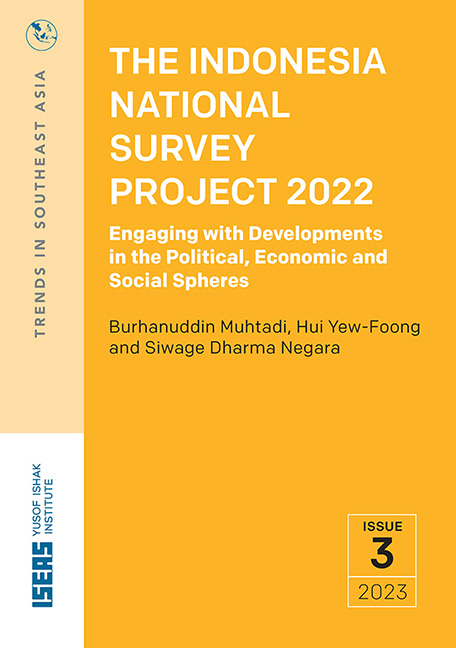 The Indonesia National Survey Project 2022
The Indonesia National Survey Project 2022 Book contents
- Frontmatter
- Foreword
- Table of Contents
- List of Figures and Tables
- The Indonesia National Survey Project 2022: Engaging with Developments in the Political, Economic and Social Spheres: Executive Summary
- 1 The Indonesia National Survey Project 2022: Engaging with Developments in the Political, Economic and Social Spheres: Introduction
- 2 Politics
- 3 Economy
- 4 International Relations
- 5 Society
- 6 Current Issues
- 7 Conclusion
7 - Conclusion
Published online by Cambridge University Press: 09 January 2024
- Frontmatter
- Foreword
- Table of Contents
- List of Figures and Tables
- The Indonesia National Survey Project 2022: Engaging with Developments in the Political, Economic and Social Spheres: Executive Summary
- 1 The Indonesia National Survey Project 2022: Engaging with Developments in the Political, Economic and Social Spheres: Introduction
- 2 Politics
- 3 Economy
- 4 International Relations
- 5 Society
- 6 Current Issues
- 7 Conclusion
Summary
The survey covers a wide range of issues, from politics to the economy, foreign relations, and social issues such as the role of Islam and perceptions of Chinese Indonesians. Not all questions are reported in this article, but we have given an overview of the key initial findings.
President Jokowi has a high approval rating of 71.8 per cent, and this comes from almost every segment of the socio-demographic spectrum. Exceptions include the Minangkabau, Sundanese, Betawi, Bugis and Malay ethnic communities, which is unsurprising since they constituted the strong support base of Jokowi’s rival Prabowo Subianto in the 2019 presidential election.
Public trust in state institutions is also high. As is the prevailing trend in post-Reformasi Indonesia, the Armed Forces garner the highest level of trust (89.6 per cent). This is followed by Provincial Governments (83.1 per cent), District/City Governments (81 per cent), the Central Government (80.4 per cent), and the President (78.7 per cent). Indonesians tend to be active in participating in voting, where voting in Regional Heads elections, the Legislative Election and the Presidential Election range from 89.4 per cent to 91.5 per cent. Participation in other political activities is much more limited, ranging from 3.2 per cent to 16 per cent for participation in political campaigns, volunteering for candidates, participation in demonstrations or protests, and contributing to a candidate’s campaign, etc.
One of the hot-button issues in Indonesia currently is President Jokowi’s plan to build a new national capital (IKN). While respondents who are aware of the IKN development programme are large (80 per cent), only 41.9 per cent agree with the programme, and those who rate the programme as urgent are much fewer (28.6 per cent). This indicates that the timing of the project is a concern for Indonesians, especially since the Indonesian economy is still recovering from the impact of the pandemic.
In general, Indonesians are optimistic about the economy. More respondents are likely to think that the current economic condition is better compared to the previous year, and a majority (60.1 per cent) think that the outlook of the economy in one year’s time will be better.
- Type
- Chapter
- Information
- The Indonesia National Survey Project 2022Engaging with Developments in the Political, Economic and Social Spheres, pp. 56 - 60Publisher: ISEAS–Yusof Ishak InstitutePrint publication year: 2023


